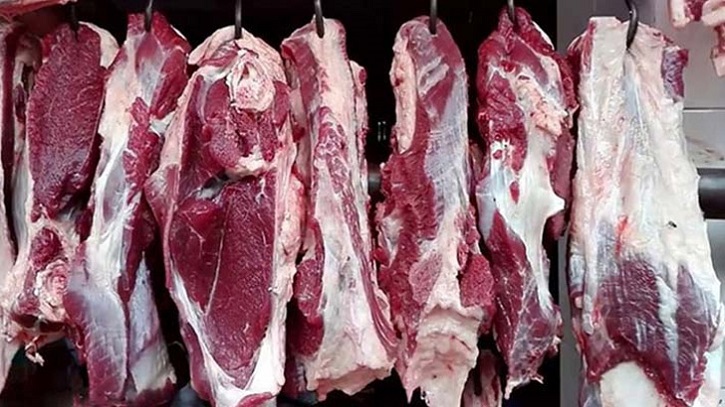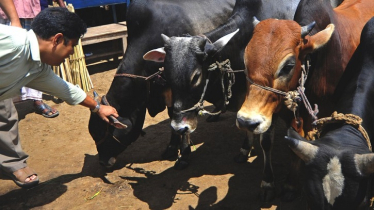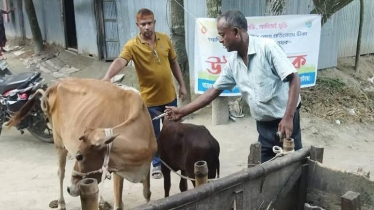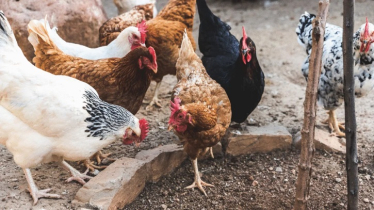
Fresh fears of anthrax have emerged in Rangpur and adjoining districts, raising alarm among doctors and the public. Despite laws requiring meat traders to obtain health clearance from the civil surgeon’s office and a license from the livestock department, most butchers operate without either. Many are unaware of the legal requirements, making disease control increasingly difficult.
Anthrax, first detected in Pirgachha upazila of Rangpur, has now spread to Gaibandha’s Sundarganj and other areas. In Sundarganj alone, 60 to 65 cattle and goats are slaughtered daily at 30 to 35 spots, yet most traders lack licenses and no routine veterinary checks are carried out.
In Mithapukur’s Imadpur union, anthrax spread from the meat of a sick cow. Samples collected from Rahmatpur market, where the animal had been slaughtered about 20 days ago, tested positive for anthrax at the Institute of Epidemiology, Disease Control and Research (IEDCR). Two people—a meat handler and a housewife—were also diagnosed after exposure. Seven people in the upazila have shown symptoms, with two confirmed cases so far.
Local livestock officials and union parishad authorities are carrying out awareness campaigns through courtyard meetings, leaflet distribution, vaccination drives, and mandatory pre-slaughter health checks. Doctors are advising people to cook meat thoroughly and avoid direct contact with sick animals.
Shukur Ali, leaseholder of Sundarganj municipal market and a meat trader, said regular health checks are conducted at the municipal slaughterhouse. “This should be implemented everywhere, especially in Bamon Danga, Ramganj, and Belka. Many sick cattle are slaughtered at Ramganj, and the meat is then sold wholesale,” he said.
Upazila Livestock Officer Dr. Biplab Kumar Dey confirmed that Sundarganj municipality and Ramganj market slaughterhouses are under strict monitoring. “No animals are allowed to be slaughtered without examination there. Notices have been sent to other slaughterhouses as well,” he added.
In Taraganj upazila of Rangpur, the situation is no better. More than 60 meat traders operate without licenses, and cattle are slaughtered without any health inspections. One trader, Hasinur Islam, admitted he was unaware of the licensing requirement until a recent meeting. “We don’t slaughter sick cattle, so we thought health checks were unnecessary,” he said.
Doctors and health experts have expressed deep concern. They warn that anthrax can spread from infected cattle through contact with mucus, saliva, blood, meat, bones, and internal organs, though it does not spread from person to person. The first sign in humans is usually skin lesions. Experts emphasize that regular livestock vaccination and a strict ban on slaughtering sick animals are critical for prevention.
Deputy Civil Surgeon of Rangpur, Dr. Ruhul Amin, said cases have now been reported in Pirgachha, Kaunia, and Mithapukur. Eight new samples have been sent to IEDCR for testing. “We urge everyone not to slaughter or consume meat from sick animals. Antibiotics are in stock and all upazila health complexes are prepared to treat patients. Since the disease spreads from animals, livestock authorities play the central role in prevention,” he said.
Rangpur District Livestock Officer Dr. Abu Sayeed reported that over 1.65 lakh cattle have already been vaccinated against anthrax since late August in Pirgachha, Kaunia, Mithapukur, and Sadar upazilas. “There is no reason to panic. Awareness campaigns are being conducted in mosques, temples, markets, and villages. No new infected cattle have been found recently,” he added.
Dr. Md. Abdur Hai Sarker, Divisional Director of the Department of Livestock in Rangpur, said efforts are underway to encourage traders to obtain licenses and ensure regular animal health checks. “Due to manpower shortages, it is not possible to post veterinarians at every market, but we are trying to carry out examinations with the help of volunteers,” he said.
Health professionals warn that without strict enforcement of licensing and veterinary checks, anthrax control measures will fail. They stress the urgent need to strengthen vaccination programs, ensure mandatory animal health examinations at all markets, and completely ban the slaughter of sick cattle to prevent the outbreak from escalating.





